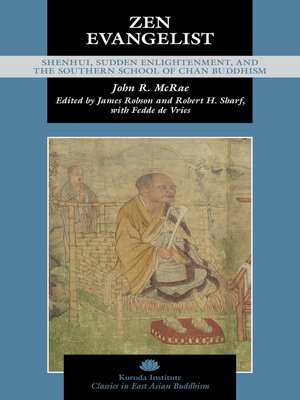Zen Evangelist
ebook ∣ Shenhui, Sudden Enlightenment, and the Southern School of Chan Buddhism · Kuroda Classics in East Asian Buddhism
By John R. McRae

Sign up to save your library
With an OverDrive account, you can save your favorite libraries for at-a-glance information about availability. Find out more about OverDrive accounts.
Find this title in Libby, the library reading app by OverDrive.



Search for a digital library with this title
Title found at these libraries:
| Loading... |
Huineng (638–713), author and hero of the Platform Sutra, is often credited with founding the Southern school of Chan Buddhism and its radical doctrine of "sudden enlightenment." However, manuscripts discovered at Dunhuang at the beginning of the twentieth century reveal that the real architect of the Southern school was Huineng's student Shenhui (684–758). An ardent evangelist for his master's teaching and a sharp critic of rival meditation teachers of his day, Shenhui was responsible for Huineng's recognition as the "sixth patriarch," for the promotion and eventual triumph of the sudden teaching, and for a somewhat combative style of Chan discourse that came to be known as "encounter dialogue." Shenhui's historical importance in the rise and success of Chan is beyond dispute, yet until now there has been no complete translation of his corpus into English.
This volume brings together John McRae's lifetime of work on the Shenhui corpus, including extensively annotated translations of all five of Shenhui's texts discovered at Dunhuang as well as McRae's seminal studies of Shenhui's life, teachings, and legacy. McRae's research explores the degree to which the received view of the Northern school teachings is a fiction created by Shenhui to score rhetorical points and that Northern and Southern teachings may have been closer to one another than the canonical narrative depicts. McRae explains Shenhui's critical role in shaping what would later emerge as "classical Chan," while remaining skeptical about the glowing image of Shenhui as an effective mentor and inspired revolutionary. This posthumously published book is the fulfillment of McRae's wish to make Shenhui's surviving writings accessible through carefully annotated English translations, allowing readers to form their own opinions.






